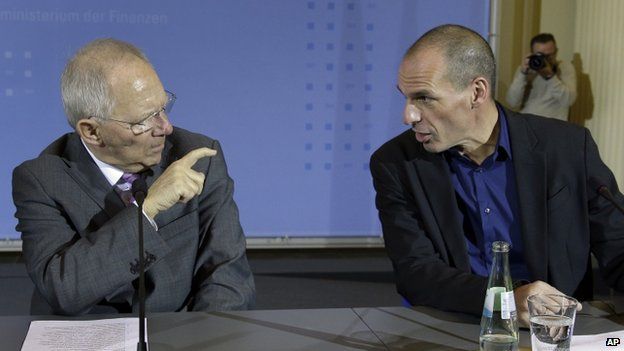Greece orders handover of 750m euros to IMF
- 11 May 2015
- Europe
Greece's cash-strapped government has begun the transfer of €750m (£544m, $834m) in debt interest to the International Monetary Fund.
The move was carried out as eurozone finance ministers met in Brussels in a bid to unlock the final €7.2bn tranche of Greece's €240bn EU/IMF bailout.
Ministers said Greece had made "progress" but more work was needed.
Greek Finance Minister Yanis Varoufakis said the country faced a cash crisis within a "couple of weeks".
"The liquidity issue is a terribly urgent issue. It's common knowledge, let's not beat around the bush," he told reporters after the talks.
The left-led Athens government has until the end of June to reach a reform deal with its international creditors.
Its finances are running so low that it has had to ask public bodies for help.
Eurozone governments have insisted that Greece agree to economic reforms in return for further bailout funding, and there had been fears that the country could default on its latest IMF debt repayment.
However, a Greek finance ministry official was quoted as saying that the order for repayment had been executed on Monday. Almost €1bn has been handed over to the IMF in interest payments since the start of May.
Greece in numbers
€320bn
Greece's debt mountain
€240bn
European bailout
- €56bn Greece owes Germany
- 177% country's debt-to-GDP ratio
- 25% fall in GDP since 2010
- 26% Greek unemployment rate
Reuters
It is unclear how the Syriza-led government came up with the funds, but the mayor of Greece's second city Thessaloniki revealed last week that he had handed over cash reserves in response to an appeal for money.
Referendum 'is right thing'
No breakthrough was expected in Brussels on Monday, but Greece was seeking a confirmation that it had made sufficient progress in negotiations.
It was hoping that part of the EU/IMF bailout money could be paid out and that the European Central Bank would restore liquidity to the country's beleaguered banks.
In a statement, the eurozone finance ministers said they "welcomed the progress that has been achieved so far" in the negotiations, but added: "We acknowledged that more time and effort are needed to bridge the gaps on the remaining open issues."
Eurogroup chairman Jeroen Dijsselbloem said there had to be a full deal on the bailout before Greece received any further payments.

Syriza has said it will not break anti-austerity electoral promises, and that has raised the prospect of a referendum on any deal agreed in Brussels.
German Finance Minister Wolfgang Schaeuble, a fierce critic of the Greek government's handling of the reform negotiations, said on Monday that "if the Greek government thinks it should have a referendum, then it should have a referendum. Perhaps that could even be the right thing".
He had a short meeting with his Greek counterpart, Yanis Varoufakis, before the Eurogroup meeting.

Chris Morris, Europe Correspondent, Brussels
Since January the government has been dominated by Syriza, the coalition of the radical left, which came into office promising to end austerity.
However, its international creditors remain unconvinced that its alternative plans to raise money will be sufficient to pay the bills.
Hence this prolonged stalemate - which has stretched Greek state finances to the limit.
The pressure on the Greek government to do a deal is immense. But if the only deal available is one that means it will have to break many of its election pledges, it could face rebellion within its own party.
That means a referendum could be called in Greece on whatever deal finally emerges. It would become, by necessity, a vote on whether the country should stay in the euro, or default on its debts and leave.

Greek Finance Minister Yanis Varoufakis was sidelined as lead negotiator after criticism of his abrasive style at a summit in Latvia last month, but he took part in Monday's talks in Brussels.
Syriza member of parliament Costas Lapavitsas told the BBC that there would be "vicious debate" within his party if a deal in Brussels did not measure up to the government's anti-austerity pledges, and the Greek people would need to have a vote on it.
"What matters to me is that there is a clear popular mandate for what we're going to do," he said.bbc

No comments:
Post a Comment